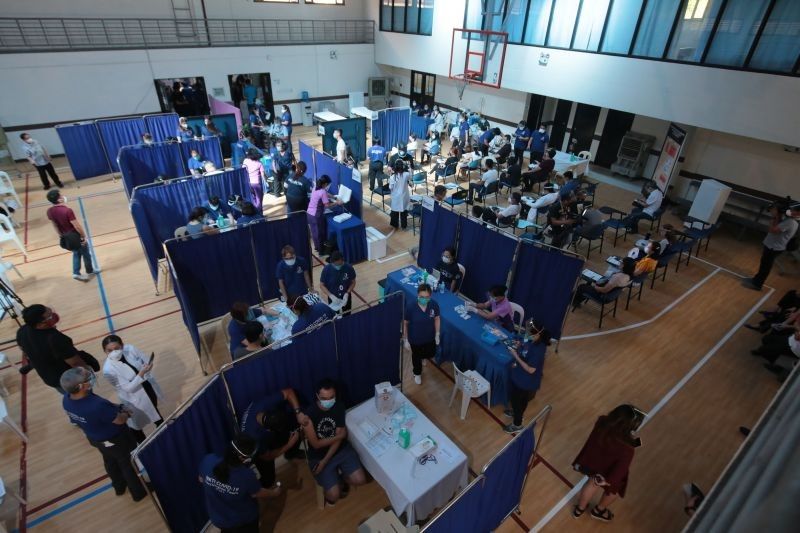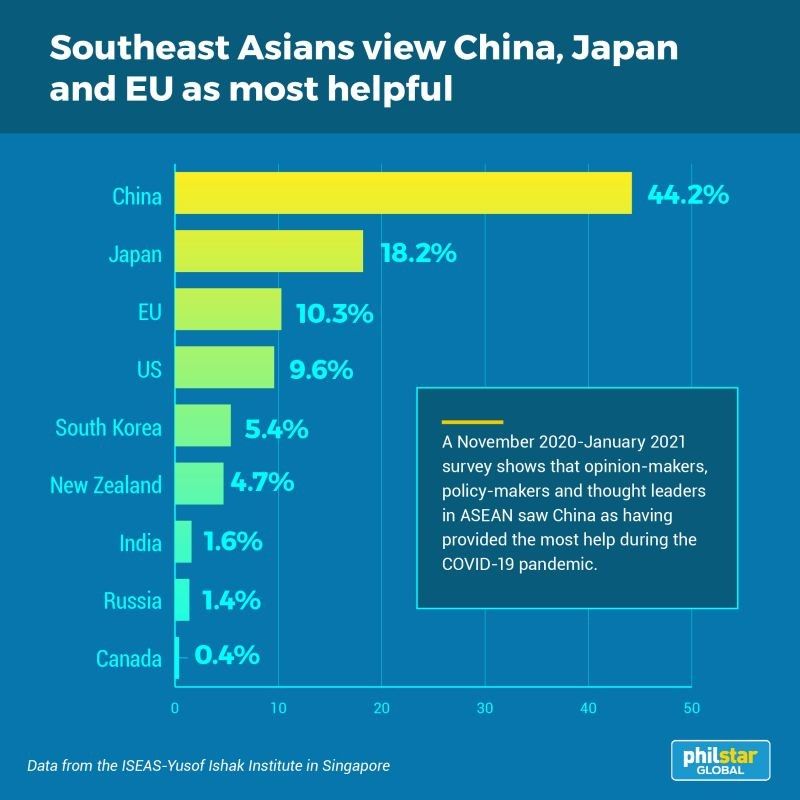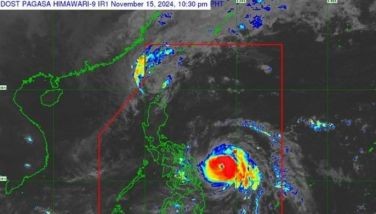ASEAN sees China as most helpful during the pandemic — survey

Southeast Asian nations ranked the pandemic as its topmost concern in 2020 and see China as number one among its dialogue partners to have given the most assistance to the region. This is according to the 2021 State of Southeast Asia survey report of the ASEAN Studies Centre at the ISEAS-Yusof Ishak Institute in Singapore.
The regional survey showed that the majority (60.7%) of the respondents from the 10 members of the Association of Southeast Asian Countries (ASEAN), approve of their government’s handling of the COVID-19. Respondents from the Philippines are most disapproving of their government’s pandemic response (53.7%).
“Of ASEAN’s 10 Dialogue Partners, China is seen as having provided the most help to the region during the pandemic with 44.2% of the respondents picking China, followed by Japan (18.2%) and the EU (10.3%),” the survey revealed.
Except Vietnam respondents who ranked the United States (29.7%) as most helpful followed closely by Japan (29.1%). China was third (13.7%). Myanmar respondents also did not rank China first, choosing Japan as the one who provided the most help (41%) and China (20.9%).
China is the top pick for respondents from the Philippines at 20.9%. The United States and the European Union tied at 16.4%.
This online survey was conducted from Nov. 18, 2020 to Jan. 10, 2021, and delivered in three languages, English (Bahasa (Indonesia), and Vietnamese. It used a purposive sampling method for its 1,032 respondents from a pool of opinion-makers, policy-makers, and thought-leaders in the region from 10 ASEAN member states.

Of the respondents, 6.9% are Filipinos and majority of them came from academia, think-tanks or research institutions. While the survey is not representative of the definitive of the views of the region, the annual report that began in 2019, has since become “a staple reference source in studies on Southeast Asia and ASEAN.”
On governments' COVID-19 response
The 10-member nations of ASEAN are Brunei, Cambodia, Indonesia, Laos, Malaysia, Myanmar, Philippines, Singapore, Thailand, and Vietnam. Among these countries, “32.7% of Southeast Asian respondents pick Singapore as the country that has provided the best leadership to ASEAN on COVID-19 while another 31.1% choose Vietnam.” Philippines fared the least at 0.5%, according to the survey.
While the majority of respondents (84.8%) think that their governments have “adequately implemented public health measures to mitigate the pandemic,” 49.0% of respondents across the region think that their governments should “offer better financial relief and subsidies to citizens impacted economically by COVID-19."
Of the 25.4% from the Philippines who approve their government’s COVID-19 response, 76.5% believe that the Duterte administration “adequately implemented public health measures to mitigate the pandemic.”
Of the 53.7% of the Filipino respondents who disapproved their government’s pandemic response 72.2% wanted the government to “encourage more scientists and medical doctors to contribute to public policy discussions and heed their advice.”
On regional concerns
The survey showed that the region is most concerned with “threat to health from the COVID-19 pandemic” at 76%, followed by the challenges that unemployment and economic recession bring (63%), and the widening socio-economic gaps and rising income disparity at 40.7%. Those top two concerns are shared by Filipinos. Third concern for Filipinos, who have to bear with the onslaughts of typhoons and floods several times in a year, is “More intense and frequent weather events resulting from climate change.”
ASEAN being slow and ineffective, and thus unable to cope with the fluid political and economic developments is still the prevailing top concern followed by a geo-political concern that ASEAN is becoming an arena and proxies of major power competition. Concern for ASEAN as a regional bloc being unable to overcome pandemic challenges only came third at 52.4%.
“If forced to align oneself in the on-going US-China rivalry, the majority of respondents choose the US (61.5%). China as a choice dropped from 46.4% in 2020 to 38.5% in 2021, even despite intensive COVID-19 diplomacy seen in the region,” the survey cited. Respondents from the Philippines has an overwhelming preference for the United States over China at 86.6%, which rose from 82.5% the previous year. Only 13.4% of the Filipino respondents chose China over the United States, and this figure dipped from 17.5% in 2019.
Top concerns over the South China Sea situation include “China’s militarisation and assertive actions in the [South China Sea] are the top concern for the region (62.4%), followed by Chinese encroachments in the exclusive economic zones and continental shelves of other littoral states (59.1%).” These concerns are high among Filipino respondents at 71.6% and 86.6% respectively.
In ASEAN, the Philippines, Malaysia, Vietnam, Brunei have territorial claims over the a cluster of oil-rich islands, reefs, and cays in the South China Sea, that China and Taiwan also dispute. How to deal with this territorial dispute, “84.6% agree that ASEAN should “take a principled stand that upholds international law, including UNCLOS and respect for the 2016 arbitral tribunal’s ruling.”
On China
China over the years has continued to beef up its presence in the disputed area despite the 2016 ruling of the Permanent Court of Arbitration (PCA) that said the claim had “no legal basis.” (See PH wins: Arbitral court invalidates China’s 9-dash line). ASEAN and China are negotiating a code of conduct for all activities in the South China Sea that is expected to be completed this year.
The survey showed 80.8% agree that the COC must be aligned with international law, including UNCLOS. Ninety-seven percent of the Filipino respondents think so. But 53.5% of all respondents or 52.2% of the Filipinos respondents do not expect the COC to resolve the territorial disputes but will only help prevent and manage incidents in the South China Sea.
“China is overwhelmingly regarded as the most influential economic power by 76.3% of the respondents – a trend that consistently holds since 2019 (73.3%) through 2020 (79.2%) to 2021… Also, China continues to be seen as the most influential political strategic power in the region although its percentage share dipped from 52.2% in 2020 to 49.1% in 2021," the survey noted.
But with its perceived growing economic, political and strategic influence also come worry and anxiety. Survey showed that 72.3% are “worried about Beijing's growing regional economic influence” while the anxiety over its strategic clout increased to 88.6% from 85.4% last year. These two concerns are most pronounced in the Philippines at 77.5% and 95% respectively.
--
VERA Files is put out by veteran journalists taking a deeper look at current issues. Vera is Latin for “true.”
- Latest
- Trending



























